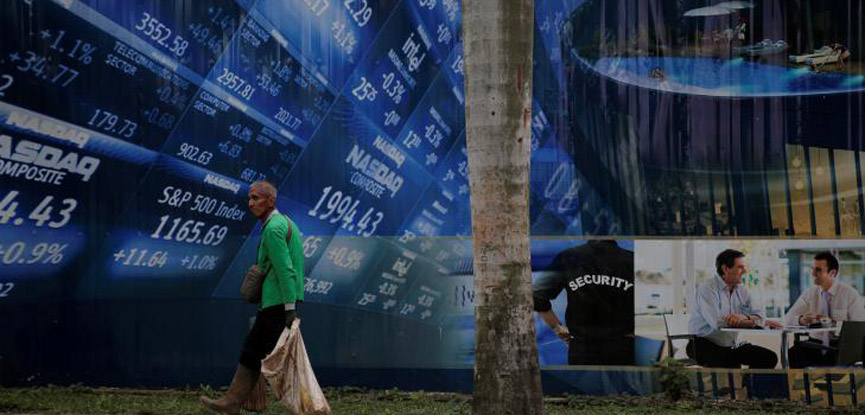Asian shares at four-month high, dollar soft after nonchalant Fed

TOKYO - Asian shares inched up to four-month highs while the dollar was finding its feet on Thursday after the US Federal Reserve stuck to its mildly upbeat economic view but gave no hint of accelerating rate hikes.
While strong economic data from the United States and elsewhere have underpinned risk assets, uncertainty and concerns over US President Donald Trump's policies have markets on edge.
"With many of his cabinet members still not approved, including (incoming Treasury Secretary Steven) Mnuchin, Trump's occasional remarks and tweets are the only guidance markets can get from the new US administration at the moment," said Shuji Shirota, head of macro strategy group in Tokyo at HSBC.
"For the time being, markets will continue to be driven by what Trump will say. It's Trump-on, Trump-off, rather than risk-on, risk-off," he added.
MSCI's broadest index of Asia-Pacific shares outside Japan rose as much as 0.6 percent at one point to hit its highest level since mid-October, with Seoul shares hitting highs last seen in July 2015.
But gains were not broad-based, with Hong Kong's Hang Seng Index slipping 0.2 percent and Singapore shares down 0.5 percent.
Japan's Nikkei also slipped 0.3 percent on the dollar's fall.
On Wall Street the picture was also mixed. The S&P 500 stabilized after a four-day losing streak, but it would have been in negative territory without a 6.1 percent rise in Apple following strong earnings.
US shares have been hit by worries that Trump's tough stance on refugees and immigration could stem inflows of talent to the US labor market and raise geopolitical tensions.
On Wednesday the Federal Reserve held interest rates steady in its first meeting since Trump took office.
While painting a relatively upbeat picture of the US economy, its statement gave no firm signal on the timing of its next rate move as Fed policymakers are still awaiting clarity on the possible impact of Trump's economic policies.
Nor was there any hint on whether it plans to trim its $4.5 trillion balance sheet, an increasingly hot topic among the Fed's policy circle.
Following the Fed, US interest rate futures <0#FF:> pared losses to stand little changed, pricing in two rate hikes this year. Only about 20 percent chance of a move in March is priced in, down from about 30 percent about a week ago.
The 10-year US Treasuries yield stepped back to 2.479 percent from Wednesday's high of 2.518 percent.
"We've been expecting the Fed's next rate hike to come in June and there was nothing from the Fed indicating a hike in March," said HSBC's Shirota.
That dented the dollar, which had been recovering earlier on a raft of solid US economic data, including The Institute for Supply Management's (ISM) index of manufacturers surging to two-year highs and strong hiring data from ADP National Employment Report.
The euro stood at $1.0778, having bounced back from Wednesday's low of $1.0730, edging back toward $1.08125, Tuesday's eight-week high touched after comments from a Trump adviser that Germany is benefiting from a "grossly undervalued" euro.
The dollar traded at 113.28 yen, having slipped from Wednesday's high of 113.95 yen.
"The dollar looks capped despite strong US data. Concerns about Trump's policy are outweighing," said Ryuta Taketomi, manager of market trading at Resona Bank.
Trump also lashed at Japan and China earlier this week, saying they are engaged in currency devaluation.
The British pound hit a 1 1/2-month high of $1.2680 on Wednesday as solid UK economic data and greater political certainty over the Brexit process encouraged a trimming of big financial bets against the currency.
The Bank of England, due to issue inflation report later in the day, is expected to stick to a neutral policy stance.
Signs of strong UK growth have financial markets already pricing in a 40 percent chance of higher official interest rates this year.
The dollar's index against a basket of six major currencies stood at 99.75, having slipped almost 4 percent from its 14-year high of 103.82 set on Jan 3.
The Australian dollar jumped 0.8 percent to a near three-month peak of $0.7648 after data showed surging commodity prices helped the country post its biggest trade surplus on record in December.
In commodities, crude oil futures eased after official data showed US crude and gasoline stockpiles rose sharply, although signs that OPEC and other producers are holding the line on output cuts are helping support prices.
Brent crude futures fell 0.4 percent to $56.59 a barrel after settling up $1.22 in the previous session. -Reuters







